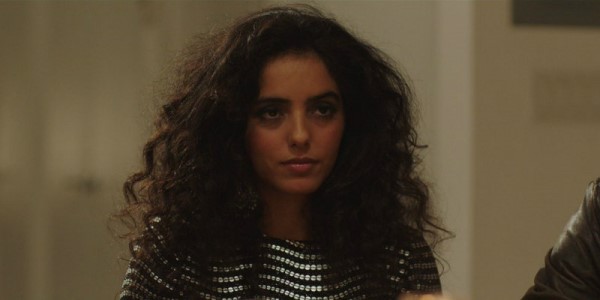Early on in This Teacher, Hafsia (Hafsia Herzi, a French actress known for her work with director Abdellatif Kechiche) is introduced to her childhood friend Zahra’s (Sarah Kazemy) husband, Heath (Gabe Fazio). Their meeting begins with a bit, as Hafsia struggles to pronounce his name.
To see such a scenario play out the way it did strike me as a refreshing subversion of storytelling – normally, it’s the ethnic minority whose name is a comedic puzzle.
A Wonderfully Unorthodox Film Full of Surprises
Mark Jackson’s wonderfully unorthodox film is full of surprises – there isn’t anything out there quite like it. The premise is simple: Hafsia is a young French-Muslim woman who works in a Paris boulangerie and doesn’t have any real responsibilities beyond baking bread. She decides to use her vacation time to go to New York and visit Zahra – now an aspiring actress who adopts the Anglicized stage name Sarah – who she hasn’t seen in many years.

Heath and Zahra’s local friends aren’t really ideal company for Hafsia, as their over-friendly dynamic feels a few steps away from the Armitage family’s relationship to Chris in Get Out. Zahra, too busy prepping for a terribly written part and sensing Hafsia’s preference to be alone – while even harboring her own prejudices against her friend now that “Sarah’s” part of an upper-class bubble – suggests that Hafsia spend the rest of her vacation in a cabin in the woods.
A Strange Trip
Hafsia accepts and from there, things become very capricious. She tells her temporary landlord that she’s a nurse, a lie that crosses over once she meets a fellow retreating couple (Lucy Walters, Kevin Kane) – the epitome of #AllLivesMatter believers. They see Hafsia through a fetishistic lens, and their interactions lead to an erratic, edge-of-your-seat final act.
The unpredictable journey of this Muslim woman in New York is the natural outcome of Jackson and co-writer Dana Thompson’s sharp, perceptive writing. Hafsia is one of the most dynamic, incalculable, challenging, and original cinematic characters in years.
From the opening scenes of her ignoring Zahra’s upscale social circle, it’s clear there are no expectations or boundaries you can place on her. Naturally, Hafsia was designed for namesake Hafsia Herzi to play, and her strong collaborative role with the writers is why she’s so effortlessly able to channel the anxieties, quirks, anger, and levity within her character’s odyssey.
Conclusion: This Teacher
This Teacher contains the most three-dimensional portrait of a Muslim character I’ve seen in some time for a Western film, owing a lot to the fact that the filmmakers render Hafsia as a complex human being and not simply an avatar for an idea or community. Inherently, the post-9/11 themes of othering and alienation are there, slowly unravelled by the white characters who have never seen a brown woman beyond their limited scope. For some of them, it’s impossible that someone like Hafsia exists.
In a way, the previous statement applies to the overall film too. In achieving its lofty ambitions through a tone that veers from black comedy to social drama to horror, the movie is a miraculous achievement.
This Teacher isn’t a commercial film, neither facile nor conformist in its treatment of character, theme and aesthetic. But it’s one that deserves a mainstream audience – as well as the attention of mainstream filmmakers – and which should serve as a benchmark for a new mainstream. This Teacher is both a step forward in representation and a wildly enthralling viewing experience.
What did you think of This Teacher? Let us know in the comments below.
This Teacher is now available in the US on DVD/VOD. A UK release is yet to be confirmed.
Watch This Teacher
Does content like this matter to you?
Become a Member and support film journalism. Unlock access to all of Film Inquiry`s great articles. Join a community of like-minded readers who are passionate about cinema - get access to our private members Network, give back to independent filmmakers, and more.